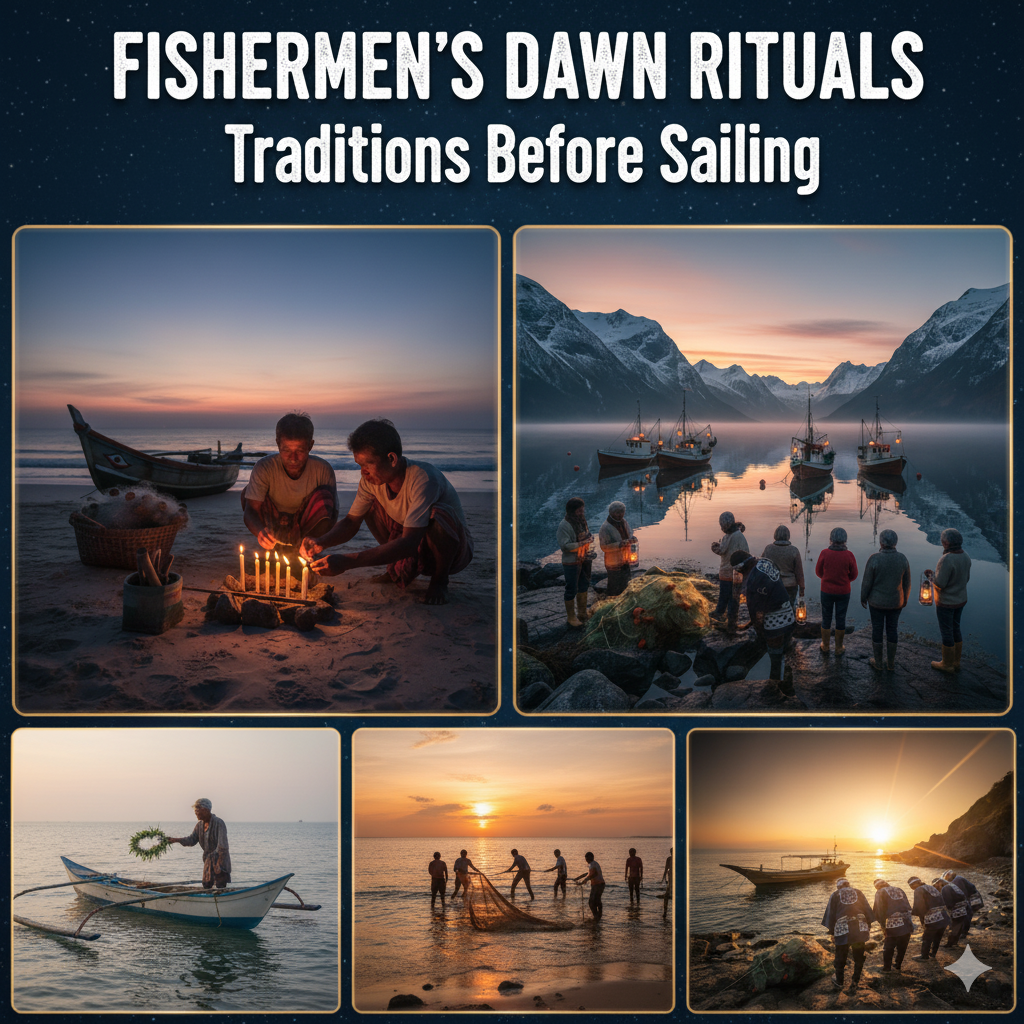Fishermen’s dawn rituals are among the most inspiring traditions of coastal life — a blend of faith, rhythm, and respect for the sea. Before the first light touches the waves, fishermen across the world prepare for their voyage with sacred gestures, whispered prayers, and community blessings that define centuries of seafaring heritage.
The Meaning Behind Fishermen‘s Dawn Rituals
Despite cultural differences, fishermen share a strikingly similar pattern of morning activity — often beginning hours before sunrise.
1. The Wake-Up Bell
Around 3 or 4 a.m., families stir. Lanterns flicker, coffee brews, and in some homes, conch shells are blown to mark the beginning of the day. For generations, this hour has been sacred — a time when the sea is calm, and the heart is clear.
2. Blessing of the Nets
Before a single wave is cut, nets are laid out and blessed.
In Southeast Asia, fishermen sprinkle holy water or seawater over the nets, whispering ancient mantras. In the Mediterranean, they draw a cross on the bow and light candles for Saint Nicholas, the patron saint of sailors.
3. The Silent Departure
The act of pushing a boat into dawn-lit water carries quiet dignity.
No loud words, no wasted motion — just the shared rhythm of oars dipping into the sea and the first scent of salt rising with the morning air.
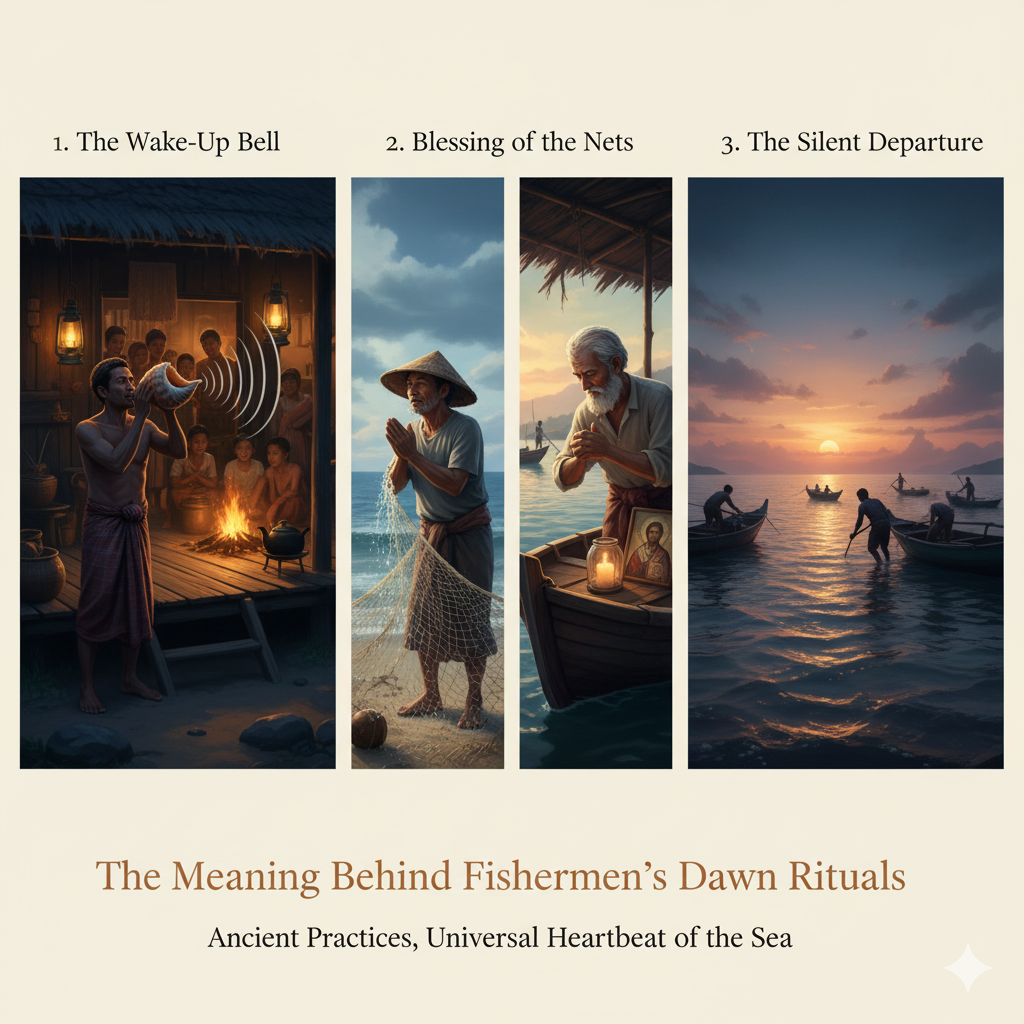
Cultural Variations of the Fishermen‘s Dawn Rituals
Kerala, India — The Sea Prayer (Kadal Pooja)
In southern India, coastal fishermen perform “Kadal Pooja”, a sacred offering to the sea goddess before sailing. They light incense, offer coconuts, and pray for calm tides and safe returns.
Women often gather near the shore to sing devotional hymns — their voices echoing against the waves.
“The sea is our mother,” says an old fisherman from Kozhikode. “We don’t go to work — we go to visit her.”
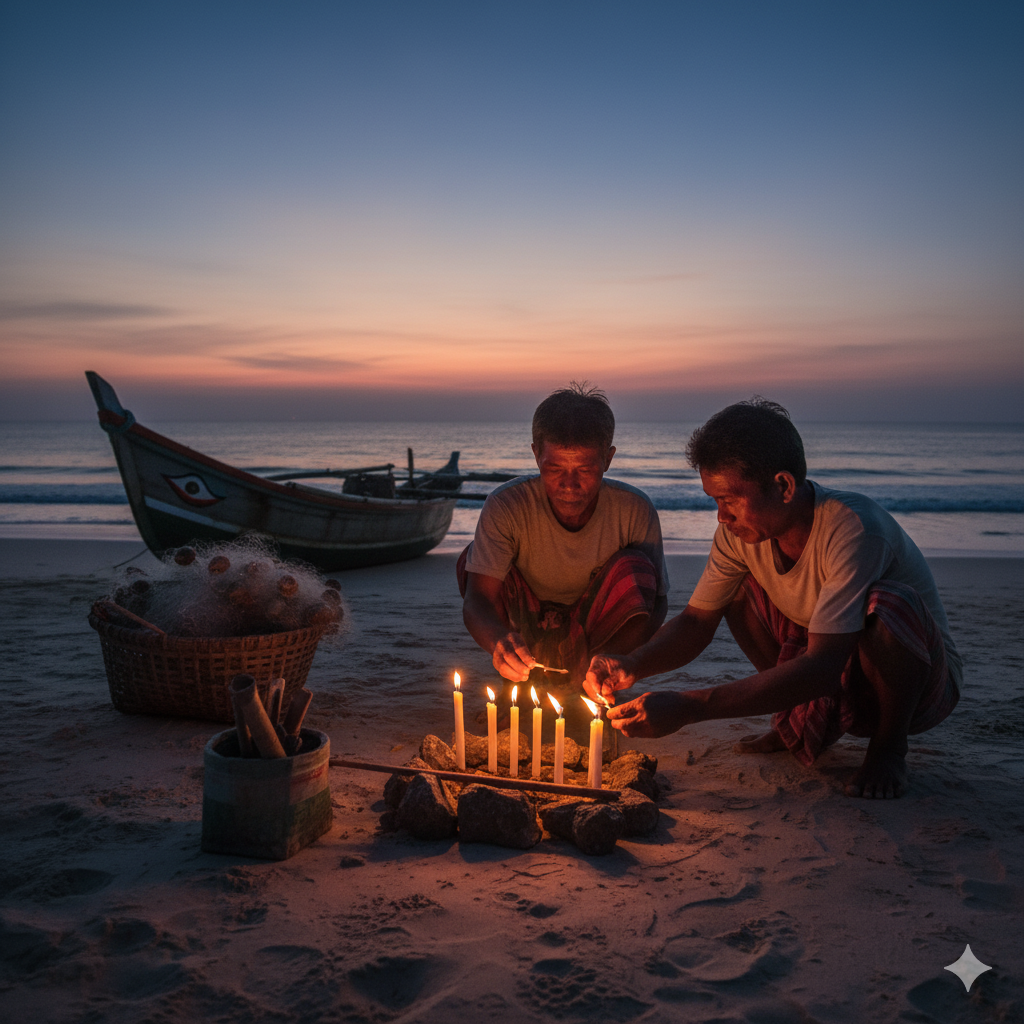
Japan — The Misogi Cleansing Ritual
Japanese fishermen believe purity invites protection. Before dawn, they perform Misogi, a Shinto cleansing ritual. They wash their hands and faces in cold seawater, bow toward the horizon, and chant short prayers for safety.
Lanterns glow softly on their boats — symbols of guidance through the unpredictable sea.
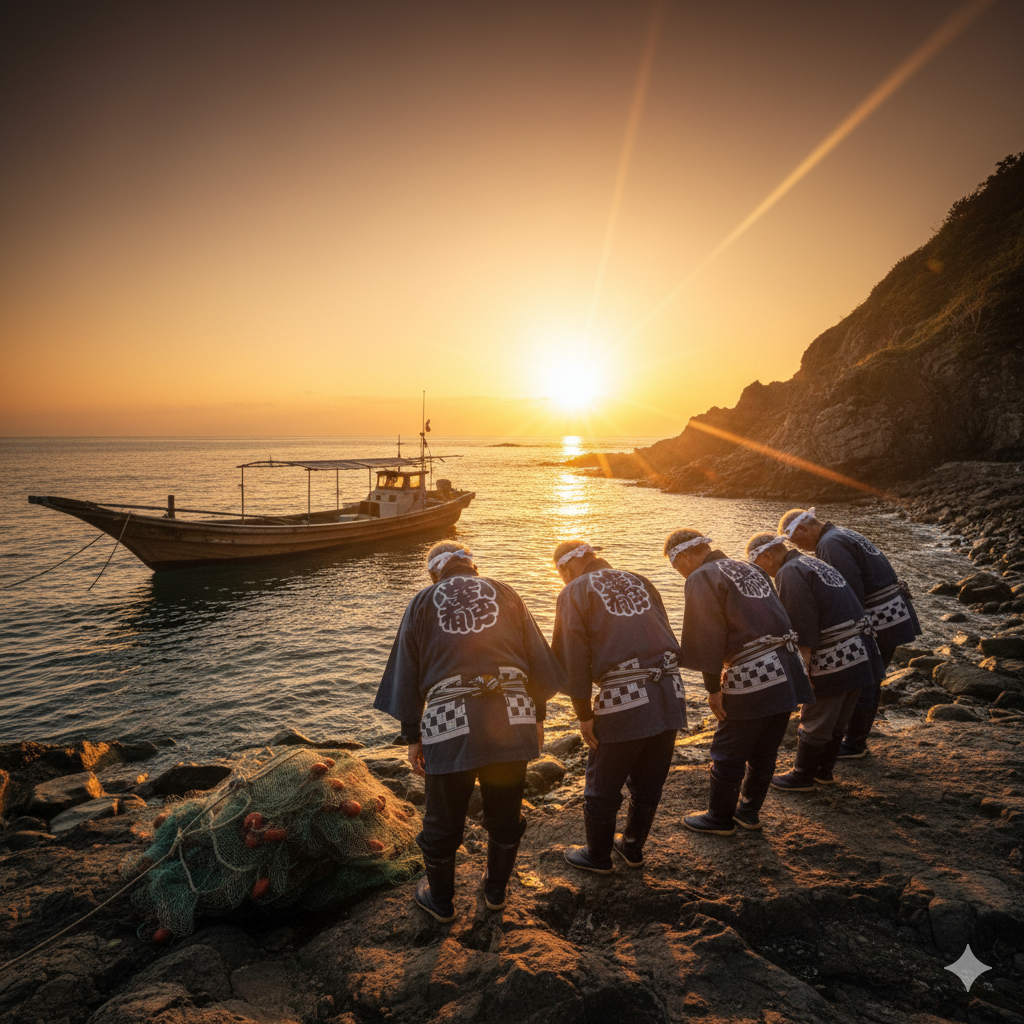
Norway — The Fjord’s Blessing
Norwegian fishermen, especially in Lofoten, light oil lamps and observe a minute of silence facing the mountains. The ritual is not always religious — it’s reflective. They acknowledge nature’s power, the memory of those lost at sea, and the privilege of returning each day.
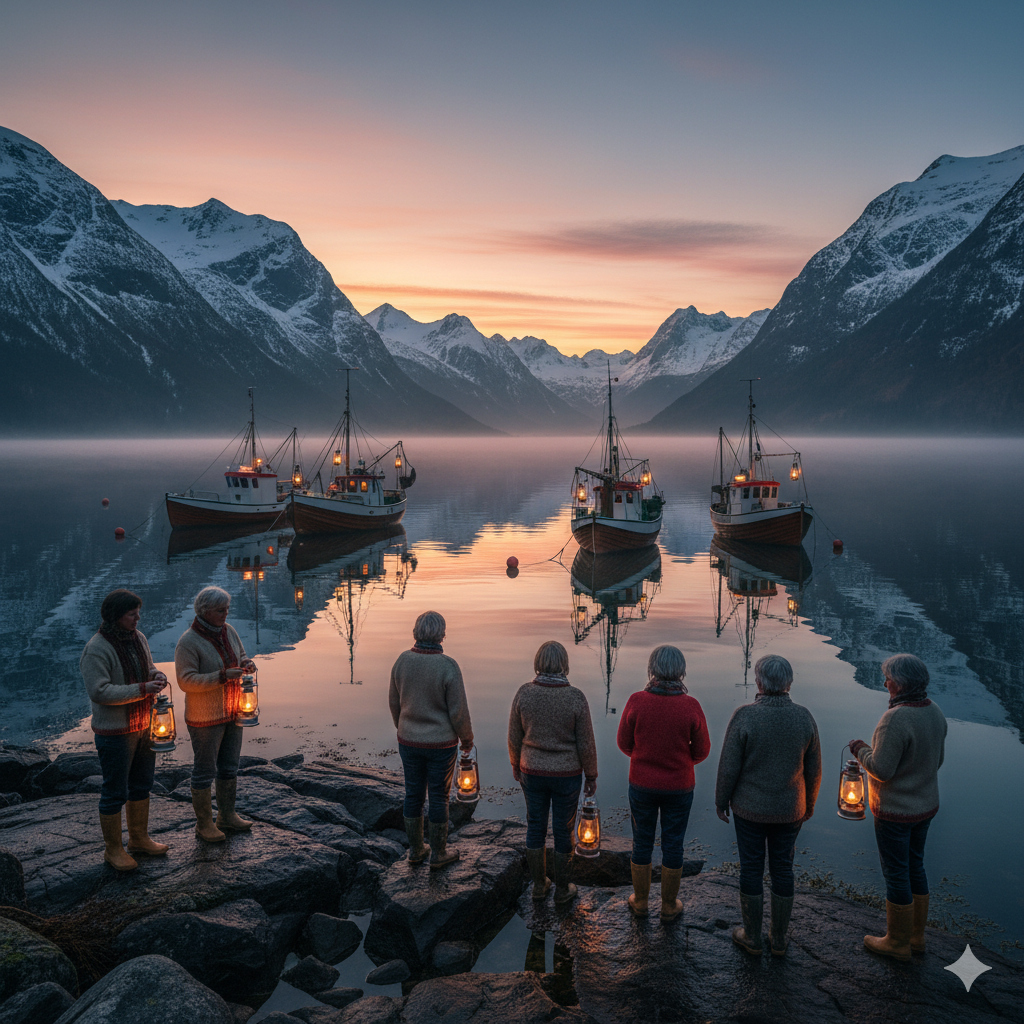
“We thank the fjord, not for the fish — but for the chance to fish again,” one local explained.
Philippines — Pahimakas sa Dagat
In Filipino coastal towns, dawn begins with chants of “Tabi-tabi po!” — a polite request to the sea spirits for permission to pass.
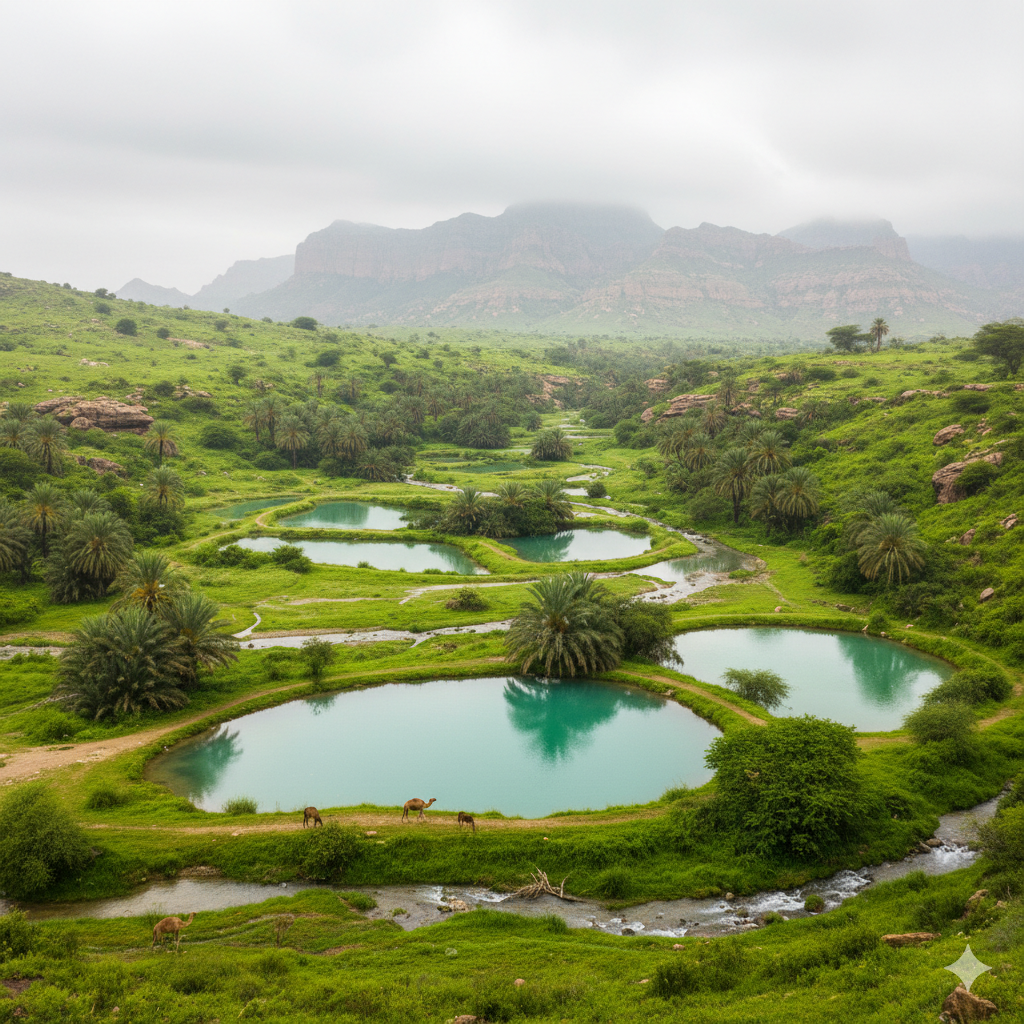
The ritual known as Pahimakas sa Dagat involves lighting candles, releasing floating flowers, and whispering family names to honor ancestors who were fishermen.
Greece — The Cross and the Compass
Greek fishermen bless their boats with olive oil and seawater, drawing a cross over the deck before leaving port. They also place sprigs of basil near the engine or rudder — believed to ward off storms and bring luck in the catch.
Sweden — The Coffee and Compass Ritual
In the chilly Scandinavian dawn, fishermen start with a moment of camaraderie — sharing hot coffee, checking compasses, and watching the first glimmer of light. For them, the ritual is a reminder of discipline, teamwork, and endurance.
Symbolism Behind the Rituals
The fishermen’s dawn rituals are rich in symbolism that transcends religion:
| Symbol | Meaning |
|---|---|
| Water | Renewal, purification, and surrender to nature |
| Fire/Light | Hope and divine protection |
| Nets | Fate, livelihood, and human effort |
| Silence | Respect for the sea and concentration before labor |
| Prayer | Connection between man and the unseen forces of nature |
These rituals are the fishermen’s language of gratitude — a silent pact between human and ocean.
Voices from the Shore
“My grandfather told me — never shout at the sea,” says a Thai fisherman from Krabi. “The sea listens, and she remembers.”
“We sing so our brothers who died at sea can find their way home,” shares a Greek sailor.
“Every sunrise feels like rebirth,” adds a woman from Sri Lanka who watches her husband set sail daily.
Ephemeral Desert Pools That Host Migratory Life
Environmental and Social Relevance Today
Modernization has changed fishing methods, but these dawn rituals persist — not as superstition, but as emotional anchors.
Environmental Awareness
These traditions remind communities to respect marine life. Many rituals include symbolic offerings instead of exploitative practices — a natural form of sustainable ethos.
Mental Preparation
Like meditation, dawn rituals prepare fishermen mentally for the day’s uncertainty — facing storms, hunger, and risk with calm focus.
Cultural Continuity
Passing these rituals from father to son keeps coastal culture alive, turning each fishing trip into a living history lesson.
UNESCO Intangible Cultural Heritage of Fishing Communities
FAQs — Fishermen’s Dawn Rituals Explained
Q1: Why do fishermen start before sunrise?
Because the calm sea at dawn improves catch quality and safety — and many see this time as spiritually favorable.
Q2: Are fishermen’s dawn rituals religious or cultural?
Both. They often blend religious belief, local folklore, and practical tradition.
Q3: Do modern fishermen still perform these rituals?
Yes — even with modern equipment, many keep traditional prayers or symbolic acts for luck and gratitude.
Q4: Which country has the most unique ritual?
Japan’s Misogi and Kerala’s Kadal Pooja are considered among the most visually and spiritually profound.
Q5: Can tourists witness or join these rituals?
In many communities like Kerala, Thailand, and the Philippines, respectful observation or photography is allowed during public ceremonies.
Humanity’s First Light – Fishermen’s Dawn Rituals
The fishermen‘s dawn rituals are humanity’s quiet handshake with the ocean.
They remind us that even in a technological age, survival still begins with humility and rhythm — the same rhythm that rocked wooden boats centuries ago.
As the world wakes up to the hum of engines and screens, somewhere a fisherman kneels before his boat, touches the sea, and whispers gratitude into the wind.
That — is the true wonder of the fishermen’s dawn.

